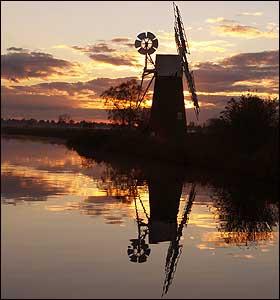31 Mar 2010
Transition Training and Consulting: a day with Norfolk County Council
 **A Guest Post by Naresh Giangrande**
**A Guest Post by Naresh Giangrande**
It was with some fear and trepidation that Alexis Rowell, a Camden Borough councillor and the author of the upcoming Transition Guide to Local Authorities (LA), and I arrived in a deeply conservative part of the country, Norfolk, to do a day with them on peak oil, climate change and the Transition town model and practice. For those that don’t know it, Norfolk is a stunningly beautiful part of the country which is partly comprised of two areas, the Norfolk Broads, a large inland waterway system and the Fens (see pics below) which is partly wild and very intensively farmed, it being one of the UKs most productive farmland. It is also largely at sea level therefore at the hard edge of climate change policy. As the Helen and Newton Harrison’s work, Green House Britain makes clear, a 5 metre rise in sea levels will mean a significant part of East Anglia would be under water.
Despite being a Conservative Council, the Members have endorsed a climate change strategy & carbon management programme, although it would be fair to say there is a fair amount of sceptism. There are also some green Councillors who are vociferously supportive of the climate change agenda. Norfolk is an interesting mix of Conservative and green with Norwich being the only Labour stronghold.
 This fear was confirmed by our first view of County Hall, with this Tornado fighter jet installed at the front entrance. We joked with a member of Traffic and Transport who we walked with and wondered out loud if instead of a bike stand Norfolk CC offered a fighter jet stand, although he assured us there were several bike stands. The RAF has a number of bases in Norfolk, a legacy of the Battle of Britain and the strategic importance of this part of the country, which explains this interesting cultural statement!
This fear was confirmed by our first view of County Hall, with this Tornado fighter jet installed at the front entrance. We joked with a member of Traffic and Transport who we walked with and wondered out loud if instead of a bike stand Norfolk CC offered a fighter jet stand, although he assured us there were several bike stands. The RAF has a number of bases in Norfolk, a legacy of the Battle of Britain and the strategic importance of this part of the country, which explains this interesting cultural statement!
Our fears were largely allayed as the make up the of two ½ day workshops was largely made up of officers and strategic partners who were largely aligned with a Transition Town message and environmentally literate; although peak oil was for many a new concept. We were asked to do a detailed peak oil presentation, which I did, drawing out the many implications of peak oil rather than dwell on the ins and outs of OPEC phantom reserves, and advanced oil recovery technology. I used the UK predicament as a close to home illustration of what happens when an oil province goes from exporter to importer and made the point that rather than see the declining North sea oil and gas production as a problem, that you can look on them as a great opportunity. The gap between supply and demand both emphasises the energy security aspect of peak oil (a point I find goes down well in conservative quarters) and the tremendous opportunity for risk takers and entrepreneurs that this holds for low carbon and renewable businesses and infrastructure.
 I also drew on the latest Feasta and Resilience/Risk Alliance report Tipping point; Near term systemic Implications of a Global Peak in Oil Production, which makes an extremely compelling case for the end of a debt based financial system when investors realise that peak oil means peak energy, and that means peak money- or no more debt. The rush for the exits in the global casino to exchange paper assets for an order of magnitude less real assets will create a tipping point, this report argues, into a new social/financial/economic regime. No need to argue for ‘regime change’ Mr Market will do it for us is the rather scary conclusion.
I also drew on the latest Feasta and Resilience/Risk Alliance report Tipping point; Near term systemic Implications of a Global Peak in Oil Production, which makes an extremely compelling case for the end of a debt based financial system when investors realise that peak oil means peak energy, and that means peak money- or no more debt. The rush for the exits in the global casino to exchange paper assets for an order of magnitude less real assets will create a tipping point, this report argues, into a new social/financial/economic regime. No need to argue for ‘regime change’ Mr Market will do it for us is the rather scary conclusion.
The effect of, for some, hearing about peak oil for the first time and laying out some of the implications, especially in financial terms scared the bejesus out of some. You could hear a pin drop in the room for both morning and afternoon sessions. However it also led to some interesting outcomes. Not least of which was the reaction of two Norfolk Resilience Forum members in the room and their realisation that they had none of this information and felt it caused a gap in their planning. As a result of the Civil Contingencies Act (2004) every local authority in the UK has a UK Resilience section that deals with emergencies and risks to business continuity amongst other things. Although Resilience Forums take a narrow view of resilience, mainly focussing on the ability to withstand shocks and maintain function, it is none the less an important function of government and interesting that the UK government is starting to use resilience in this way.
The rest of the work shop had two main focuses. The first was to initiate some strategic scenario planning thinking, and the second was a nuts and bolts look at the synergies between LA’s and Transition Initiatives and what might a Transition LA look like.
We have found that one of the main reasons why LAs and other organisations (and maybe individuals) have not taken up the Transition model is the lack of belief or understanding that the future might not be like the present, and that there is compelling evidence for the next 20 years not being anything like the last 20 years. For this work we used David Holmgren’s Future Scenarios; and the work of Royal Dutch Shell’s pioneering work on scenario planning. There is a certain irony in this which I am sure will titivate peak oil conspiracy theorists no end.
 These future scenarios we used were Business as Usual, Green Technology, Transition/ Energy Descent, and Collapse. We devised a game that centred around matching cards that each had on them an event or a technology with these 4 potential stories of what our future might hold. This exercise enabled participants to think clearly about say electric cars and whether they ‘described’ a green technology or a collapse scenario. I saw many people for the first time questioning what kind of future we might have and what might that look like, in very concrete terms (no pun intended). I wish to emphasis that this exercise was not about getting participants to agree to or sign up to a particular scenario as the right one, but rather to think about the world we are creating and the pathways to one scenario or the other, and how we might start to plan for or design a future we actually want.
These future scenarios we used were Business as Usual, Green Technology, Transition/ Energy Descent, and Collapse. We devised a game that centred around matching cards that each had on them an event or a technology with these 4 potential stories of what our future might hold. This exercise enabled participants to think clearly about say electric cars and whether they ‘described’ a green technology or a collapse scenario. I saw many people for the first time questioning what kind of future we might have and what might that look like, in very concrete terms (no pun intended). I wish to emphasis that this exercise was not about getting participants to agree to or sign up to a particular scenario as the right one, but rather to think about the world we are creating and the pathways to one scenario or the other, and how we might start to plan for or design a future we actually want.
Lastly Alexis ran a session on what other LAs are doing around the country and how a LA can use the Transition initiatives in their area to cost effectively deliver services. There are dozens of National Performance Indicators (NPI) that Transition can help their Authority to deliver, and there are now some good examples of them doing that. There are also many ways in which a council can lead the way by, amongst other suggestions:
- Setting up Revolving Water Efficiency Funds; when an efficiency is created by water recycling or rain water capture the money saved in put into a fund that finances further efficiencies and savings.
- Creating mini food chains; linking local food producers and consumers.
- Greening Council transport fleets by creating bio methane using anaerobic digestion
- Building using Passivhaus standards
Our participants were very complimentary, some of the feedback:
- Keep it up, you’ve inspired me
- It was great to see such a range of people and Norfolk County Council departments represented – very encouraging that a momentum can be built up.
- Very enjoyable with passionate enthusiastic presenters. Thanks.
- Very thought provoking!
- All relevant, an excellent session
- Very well delivered, engaging and spot on in terms of the information, content and style.
We all had an enjoyable day discussing and exchanging views and ideas on significant issues. We are looking forward to the work the many Transition groups in the area will be doing with their Council. My only regret for the day is that I didn’t get a ride on the Tornado, but maybe that would have been against the spirit of the day.
Our sincere thanks to the Gaia Trust for their generous support in helping us create and pilot this workshop, and to Esme Holtom, Climate change officer for Norfolk County Council, for her vision and hard work in making this happen.
………………………………………………………
Naresh Giangrande for Transition Training and Consulting.
There is a workshop day planned for the 23rd of June in London designed for Local Authority and NGO officers on Peak oil and Climate change strategies and engagement using the Transition Town model and practice. Email Cliona O’Conaill <cliona (at) transitionnetwork.org> for more information.
Hannah Thorogood
31 Mar 4:13pm
Norfolk is indeed a interesting area. There are two Permaculture Design certificate courses happening there in the first half of this year. There are straw bale builds, power stations run on chicken manure, wind turbines galore, loads of great little thriving market towns. Look out South Westers, East Anglia is where it is at for transition, permaculture, and all that jazz! x x
Matt Walker
31 Mar 4:53pm
Sounds good. Now lets see the local councils really engage with the Transition initiatives around the county.
berniebarclay
31 Mar 6:15pm
I would also like to see the Local Education Authority get to grips with the implications of climate change and peak oil for the children in the county – heck, all children!
Elizabeth
31 Mar 6:36pm
It’s a bit unfair to be automatically suspicious of Conservatives and their reaction to the green/transition agenda (looking at the name of their party it seems to me more than possible to hook them in with plans for greater conservation of habitats and species).
OK, gripe over: this was really interesting for me on how local politics can be engaged. Any ideas on how we can get our own local councils and authorities on board with Transition? Any tips as to how to approach them, or should I just plug the London workshop?
Rob
31 Mar 6:46pm
Hi Elizabeth… I agree entirely, in its good manifestation, there is much common ground that can be found with Conservatives, as with any political party, if we can seek out the common ground, as opposed to the differences…. the tips you are asking for…much of that will be in Alexis Rowell’s forthcoming Transition Books masterpiece about how to work with you local Council…. I’m sure he will be doing a workshop on that at the 2010 Transition Network conference (dates to be announced within a day or two….)
Shane Hughes
31 Mar 10:46pm
Thanks for this insight Naresh! I look forward to picking your brains. I’m going to be giving a similar Transition Training and Consulting workshop for Bedfordshire (also East Anglia) businesses. The event is being put on by the Green Business Network on the 19th of May. Could do with a little support if anyone is interested co-presenting.
I’ve got another similar workshop mid July, this one is yet to be shaped. From reading your post perhaps i could focus on LA’s. Do you think it’s easier to separat LA’s and business in this type of workshop? or treat them both as organisations?
Joanne Poyourow
31 Mar 10:55pm
“We devised a game that centred around matching cards that each had on them an event or a technology with these 4 potential stories of what our future might hold.”
Naresh, can you share this game for us to see and use?
— Joanne in Los Angeles
Julie Barker
1 Apr 3:14am
I would be grateful to see details of this game, also.
I have a book by Julian Edney called “Greed” that includes a game he calls “The Nuts Game: A concise Commons Dilemma Analogue”. iUniverse Inc. ISBN- 13:978-0-595-80451-1 (ebk)It’s also available pbk
The game addresses the “commmons problem (that) occurs when a community of consumers consumes resources at a rate high enough to endanger the regeneration of the resource itself.”
I have not yet had a chance to use the game, but wondered if such games would be useful in both student and adult groups.
Julie in Ontario, Canada
vel
1 Apr 1:41pm
We need to adapt. Take a look at this article The Great Transition: http://www.scribd.com/doc/21656220/The-Great-Transition-Navigating-Social-Economic-Ecological-Change-in-Turbulent-Times
Shane Hughes
1 Apr 6:05pm
talking about right wing politics and peak oil, i spotted that the British National Party (or British Racist Party) have fully embraced peak oil;
BNP website;
“The BNP is making peak oil a high profile issue for a number of reasons;
…When the BNP does win political power Peak Oil will not be something that we can postpone. It will be happening at the very time that we come to power. In fact it may well be an important catalyst that helps us to win political power because we are the ones talking about it now.
… We are going to make a lot of noise about Peak Oil because it is yet another example of how the current political process has failed the people of this country”
http://bnp.org.uk/peakoil/politics.htm
Jim
2 Apr 6:52pm
Hi Vel-
Thanks for the reference on The Great Transition document from British Columbia (2009), which I first thought the same as
http://en.wikipedia.org/wiki/Great_Transition
(Harvard Univ, 1995-ongoing)
I hadn’t realized that Kenneth Boulding might get credit for first using the term in his book title.
He and his wife were so very far ahead of their time–
http://en.wikipedia.org/wiki/Elise_M._Boulding
Boulding, K. (1964) The Meaning of the Twentieth Century: The Great Transition, Harper & Row.
http://j.mp/bKpwPr <cheap used copies
http://j.mp/bB4J7o <– global library catalog
http://j.mp/cauVQ2 <– brief summary
which was likely inspired by the famous Polanyi book, The Great Transformation (1944)
http://j.mp/bH8tF3
Feel free to drop me an email at smithmillcreek *(at) gmail if you are interested in comparing and contrasting the various and sundry (Great) Transition theories
Jim
2 Apr 9:38pm
My previous comment inspired me to look up Elise Boulding, and I found this audio and interview transcription. If you like Transition concepts, you will probably enjoy reading this:
Elise Boulding
Professor Emeritus of Sociology at Dartmouth College and Former Secretary General of the International Peace Research Association
http://www.beyondintractability.org/audio/elise_boulding/?nid=2413
Here’s a few quotes to give a taste:
“My dissertation was on the effect of industrialization on women’s roles. I studied pre-industrial societies.”
“Always remember that there are two groups that maybe won’t be called upon in ways they could be. One is women, and the other is children and young people.”
“Practice networking.”
“His thesis was that societies that have positive images of the future are empowered by their own images to act creatively in the present. Societies that have negative images will just wither away.”
“The best way to be active through the U.N. is through the NGO’s you belong to. You pick the NGO you want to represent your concerns. I am a member of the Women’s International League. I am a Quaker. I have representatives at the U.N. that I can work with.”
Dave Dann
3 Apr 7:39pm
Just for the record, Totnes has a Conservative MP (surely?).
Western Morning News
Saturday, May 16, 2009, had
‘VETERAN Tory MP Anthony Steen has claimed tens of thousands of pounds in Commons expenses for work on his million-pound Devon home, it emerged last night.
A breakdown of the £87,729 claimed by the Totnes MP over four years laid bare the extent of work carried out at the property, which also boasts a small swimming pool and tennis court. Bills included stopping rabbits nibbling shrubs, having 500 trees inspected by experts and fencing off fields on a drive leading to stables.
The information came to light as the Daily Telegraph published yet more details of the way public money has been used by MPs.’
Eric Leach
5 Apr 9:17am
This work with Local Authorities is very important. Here in London, however, there are are also other groups who would value being educated. Can I suggest the London Forum (www.londonforum.org.uk)?It is well established and represents the interests of amenity and civic societies on issues that are important for the quality of life of Londoners. It’s run by volunteers and has regular, lively debates in central London. Perhaps Alexis Rowell could contact the forum and arrange to speak at one of its events. I attended the last forum debate (on empowerment BTW) and I’d happilly support an approach to the forum Chair Peter Eversden.
Towards Transition Local Authorities « Transition Town Farnham
7 Apr 10:18am
[…] I don’t know whether Surrey or Waverley councils are ready for this yet, but you can read more about it (warts and all) here: https://www.transitionculture.org/2010/03/31/transition-training-and-consulting-a-day-with-norfolk-county… […]